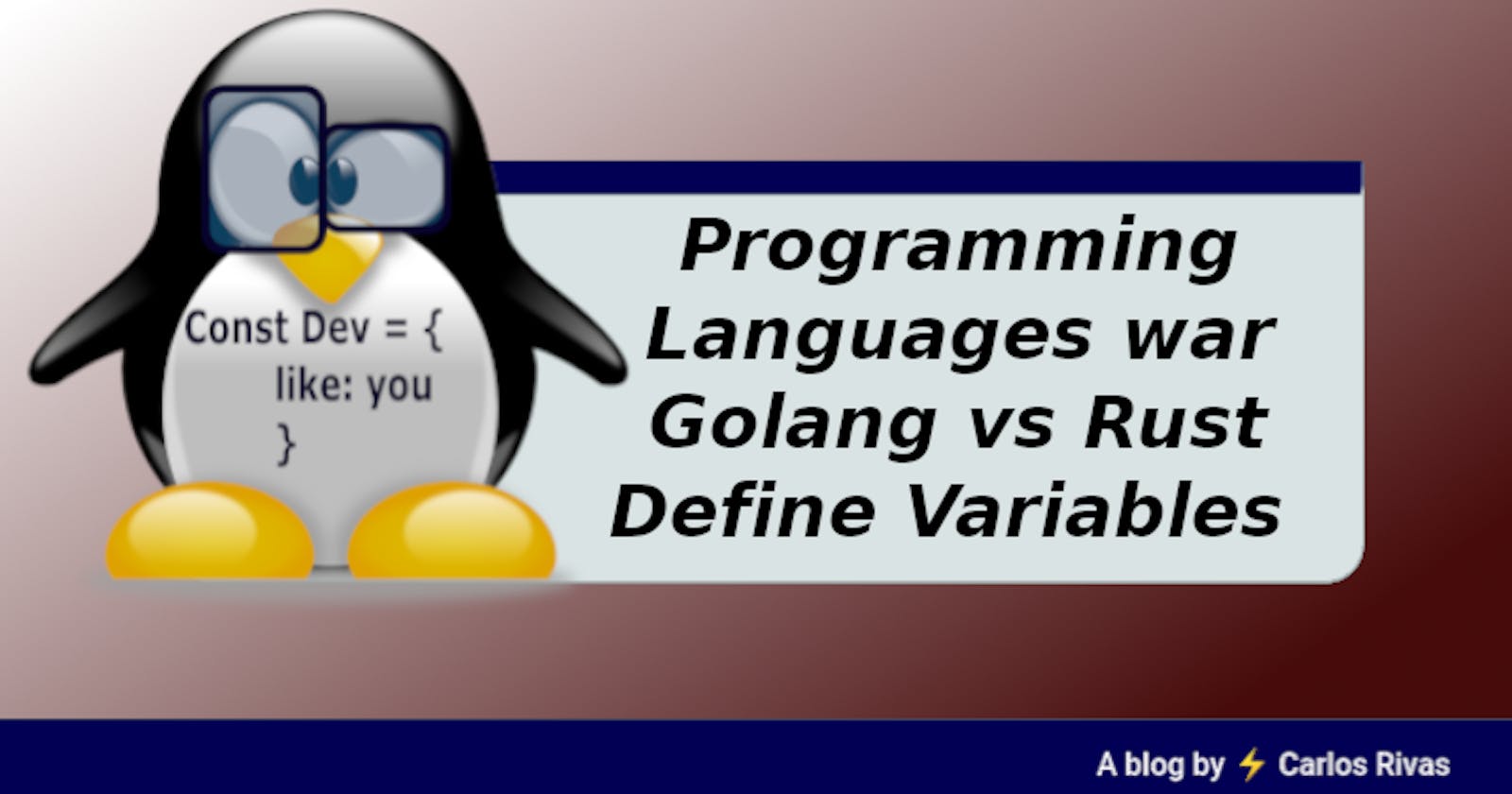Define Variables
Hey, my friends, a new post about this war.
I don't know which is better, but I'll try to figure it out. I hope y'all enjoy this series. Here we go!
In this opportunity I'm going to check up the deep basic information that these languages could hide, I think I'm being dramatic. 😅
We're going to figure out how to define variables.
I'm going to do a little script with all examples and a little more. =D
Variables
It's a space of memory where you could save information what you need to manipulate. These two languages need to define the type of variable in front of the name or not. It's important to say that exist boolean, numbers, strings, and others.
Golang/Go
Before defining variables, I'm going to write about the structure
Do you remember our hello.go
hello.go
package main import "fmt"
func main() {
fmt.Println("Hello, World!")
}
- The first line: Tells the Go compiler that the package should compile as an executable.
- Second line: Import fmt, fmt is a core library package that contains functionalities related to formatting and printing output.
- And the end func main() is the entry point of an executable program.
Now you know theory things now I'm going to make magic. Ok no. I'm going to make code.

It's indispensable that you know that exist var and const like special words to define variables and constants.
Example
const NAME string = "Luffy"
func main() {
var country string = "Brazil"
fmt.Printf("Hello, %s from %s\n", NAME, country)
}
But Go is so smart, then doesn't need that you tell him the type, he can discover it.
Example
func main() {
var color = "Blue"
var number = 20
fmt.Printf("Type: %T Value: %v\n", number, number)
fmt.Printf("Type: %T Value: %v\n", color, color)
}
These are all basic types of variables that exist in Golang
Boolean: bool
String: string
Integers: int int8 int16 int32 int64 uint uint8 uint16 uint32 uint64 uintptr
Byte: byte // alias for uint8
Rune: rune // alias for int32 // represents a Unicode code point
Float: float32 float64
Complex: complex64 complex128
The last trick that I'm going to use is to disappear the word "var"
func main() {
crew := "Straw Hat Pirates"
fmt.Printf("Type: %T Value: %v\n", crew, crew)
}
I almost forget something important, the zero value, what means that?
func main() {
var i int
var f float64
var b bool
var s string
fmt.Printf("%v %v %v %q\n", i, f, b, s)
}
Each type of variable has a value by default, Then if you declare a variable, but you don't initialize it, the variable is going to take the default value.
You can use any method to declare a variable, but I recommend that you should specify the datatype to new variables.

The last challenge if you want to try it. What if?
func main() {
number := 1 number = "one"
fmt.Printf("%v \n", number)
}
Rust
Before defining variables, I'm going to write about the structure. What is that, a déjà vu?
Do you remember our main.rs
fn main() {
println!("Hello, world!");
}
- fn main() is always the first code that runs in every executable Rust program.
Rust has Variables, Variables Mutability, and Constants
It's indispensable that you know that exist let, let mut, and const like special words to define variables and constants.
Example
const NAME: &str = "Nami";
fn main() {
let country: &str = "Swedish";
println!("Hello, {} from {}!", NAME, country);
}
The difference between let and let mut, let: you can't change the value of the variable, and let mut you can.
But if "let" you can't change and constant either, what is the difference?
In addition to the declaration are "let" or "const", in the constant the type of the value must be annotated and can be declared in any scope.
Rust is so smart too because it doesn't need that you tell him the type, he can discover it.
Example
use typename::TypeName;
fn main() {
let color = "Blue";
let number = 18;
println!("Type: {}, value: {}", color.type_name_of(), color);
println!("Type: {}, value: {}", number.type_name_of(), number);
}
Add this like dependence, in the file Cargo.toml
[dependencies]typename = "0.1.1"
I know that I haven't explained that, but believe me, it's way easier to show the type of data with this method, in another post, I'm going to explain that.
These are all basic types of variables that exist in Rust
Boolean: bool
String: &str
Character: char
Integers: i8 i16 i32 i64 i128 isize u8 u16 u32 u64 u128 usize
Float: f32 f64
Rust does not have NULL, then you can't do something like that:
fn main() {
let color: &str;
let number: i8;
println!("Value: {}", number);
println!("Value: {}", color);
}
 And again the same challenge, what if?
And again the same challenge, what if?
fn main() {
let mut number = 1;
number = "one";
println!("Value: {}", number);
}
The last thing that you should know, I am sure you noticed semicolon use, is not mandatory in the last line of code, but if you have to write more than one line, you have to use a semicolon.
My recommendation about semicolons is to use them all the time. But if you forget, the language will tell you. 😉
Conclusion
Structure: They are very similar but Golang is easier than Rust because you don't have to use a semicolon or external dependence to print type of value, and Rust for now is not possible to use null or zero value.
Then this time Golang takes a little advantage over Rust.
But I think it is not enough to know who is better.
What do you think? Is the same for you?
I hope you enjoy my post and remember that I am just a Dev like you!

